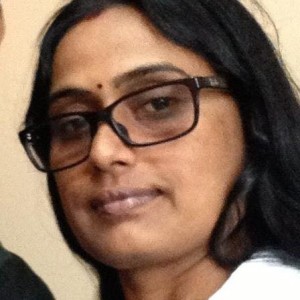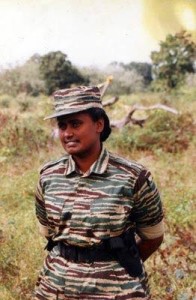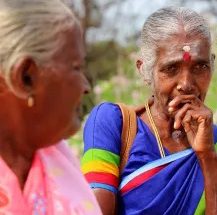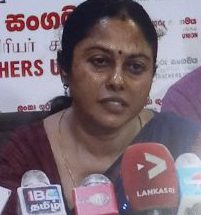Manjula Wediwardena
Thamalini
“ The topic of the article was “ We are Brethren” It was adopted from her emotional replies to the questions on the Sinhala Community. “Yes we have waged war against state terrorism. Our Sinhala brethren and the International Community should distinguish between a freedom fight and terrorism. It is a misconception that we are terrorists. We are militants in all respects and our target is not the civilians in any manner.
Named Thamalini she is the present political women wing leader of the LTTE. I met her in Jaffna during a cultural show called “Tamils meets for humanity” . We attempted to approach her vision in life. I lay down here the very words when she spoke out her heart.”
The above was an excerpt from my introduction of her in my article that appeared in the Rawaya newspaper somewhere in October 2002. I hope that the matters emerged during our conversation with her in a corner of the Weerasingham Hall in Jaffna is still valid. Her analysis of liberation of women liberty was relevant to every woman in the world. She did not demonstrate hatred towards the Sihnala community. Thamalini who said “ We are brethren” has been in custody of the “Sinhala” government since May 27, 2009. Thamalini who had been displaced with her mother and sister came from Pudumatalan to the Vavuniya “ camp of woe” like many other Tamils. Later she was taken into custody by a special police unit , brought to Colombo and jailed. A lawyer was allowed to appear for her one year and four months after her arrest. It was September 20, 2010. Attorney at Law C. Pubalasingham told court presided over by Colombo Chief Magistrate Rashmi Singappuli that Thamalini was only the political wing leader and that she was not involved in the military wing. He made factual submissions to establish it. However, the Sinhala government‘s priori -assumption that she was a terrorist leader resulted in the state counsels objecting to her release on bail under the pretext of further investigations They have not yet file charges against her, but they will not allow her bail until she is mentally incapacitated. This has resulted in postponing the case for a further date every time it is taken up for hearing and she is brought to court and taken to the jail. It is just a news story of few lines. However the “Sinhala Brethren are moribund inactive and they prefer to be silent on the predicament of Tamalini. Their fear caused by pre-mediated misconception that she was terrorist leader, and their misguided attitudes and unconsciousness of their rights of a democracy has lead to this situation. It is surprising, that al least the activists of women’s movements have avoided the case of Tamalini.
“ A large percentage of any suppression has a direct impact on the woman. They have a duty to join hands against the traditional concept that the woman is a person who should keep the house and attend to the needs of the family that resulted in suppression of women. Her protection should be built in herself without expecting it from any outside source. If she does not stand for her rights, who else will do it ? She should rise against suppression in the present day society where her father, brother, son her husband or any relative is not able to provide her protection”
It was the candid and unaffected, opinion of Thamalini.
Let’s look at Subramanium Shiwathai alias Thamalini’s flash back to the memoirs of her past life. “ It is a terrific dream. A dream engulfed in pitch dark, a cinematic scene full of woe and sorrow. Many things beyond my understanding were happening.
“People breathing their last in pools of blood and scattered limbs, shops and boutiques in fire, shadows of soldiers, pervaded the surroundings while terror pervaded out minds. We could only cry in helplessness. One day my father did not return after work. He had been arrested by the army. He returned after three months of custody. There was much woe and sorrow in the house for that three months and we underwent innumerable sufferings. Thereafter, we were frightened by the sight of the soldiers. I can remember as if it were yesterday. In 1983 we were in the Vanni. Tens of thousands of Tamils fled to the Vanni to escape death during the 1983 riots. I heard from them how schoolchildren were hacked to death, how women were raped, and how people were burnt alive. Before long we experienced aerial attacks on our areas. I lost my desire to lean when I felt that we were under siege. One day, the army stormed our school and manhandled our class teacher until he started to bleed. Then they ordered the principal, the teachers and the children to keep kneeling down in the garden. I saw many socking incidents. One of my classmates who was hit by a bomb died instantly. Our life is full of such bitter experiences.”
“Meanwhile, the liberation movement was emerging. It was natural that we had the impression that they were fighting for out liberty. They secretly came to our houses and borrowed something to eat and then disappeared. They were longing to see their parents. We considered as our brothers. They told us to learn well and that our future would be very bright. Many of them sacrificed their life, but they inspired us much. We had not freedom to attend school and it was a dream to find employment even after completing studies. Everyone was living in constant fear of a possible disaster. Women were the worst affected. We were subject to humiliations on our way to school. Their indecent remarks caused much pain of mind. We passed our childhood and attained youth through such unpleasant experiences. Then came the Indian forces, but they were in the same boat.
“ Our main problem was homelessness. We were often displaced due to the conflicts. When my mother is cooking our meals , we hear that the army is coming. All of us run into the jungle for our dear life. We do not know why they are coming or what they would do or how long they would stay in the village. However we return after a long stay in the jungle to find several of our relatives and friends missing or killed. In this scenario, how could we talk about freedom? This compelled me to do something purposeful. I soon realised that the only way to meet this object was to become a militant. “
The decisive event in her life occurred in 1991. By then she had passed her Ordinary Level Examination from the Paranthan Hindu College amid the blast of barrel bombs and entered the Kilinochchi Central College for her Advanced Level. She witnessed the first phase of the Elephant Pass battle. Attacks and counter attacks that demonstrated valour and sacrifice of life echoed and re-echoed in her heart.
She saw with tears burst into her eyes the bodies of Tamil militants lying on their mother land. Among them were the bodies of militants who had came from Batticaloa to the Vanni and scarified their life However their parents were not present to pay last respects to the dead sons and daughters. They did not have the opportunity to see the faces of their children for the last time and to shed a tear of love on their lifeless bodies. She was perturbed by their esteemed sacrifices of the militants. It brought her relentless sorrow. The feeling that they did not have any one known to them round the corner caused her much pain of mind. The only question she asked herself was “ Why must not we join their campaign” and it compelled her to join the liberation movement before long.
However, she had to postpone her decision due to the misgivings of her parents. Meanwhile she met a woman militant and made friendly with her. They were fast friends when Major Nilahan was killed. He was a hero from her village. His body lay for the people to pay their last respects. Thamalini went with a wreath to pay her last respects to the militant and after paying tribute to the war hero she did not have the inclination to return home. It was a turning point in her life.
“ You know the attitude of the society toward women and how did you take your decision in that backdrop” I asked, but she did not laugh at me.
“ I joined the organization in 1991. Initially the Tamil society had much fear and lot of uncertainty about young women joining the organization. However, it was a well disciplined organization and the young women did not resort to any misdemeanours. This totally eliminated the misgivings of the society. The society was soon convinced that the young women joining the organization had a noble object. As a result everyone respected the women militants. By 1991 women militants in the north was a common sight. They would walk along the road, ride on motorcycles, come home and return to the field where they sacrificed their life. Therefore, I did not have to worry about the response of the society.”
Thamilini’s sympathetic was not only towards their soldiers, but many others who were killed.
“ The bodies of our brothers and sisters was a gruesome sight for us. So was the sight of the Sinhala soldier who was killed. We really felt sorry for him. The thought, who he is sparks off in the mind. We feel that they also have mothers. They also must have their expectations jus as we have an object for our campaign. We are fighting to save our land, our places of worship, our villages and towns. However, we wonder why the youth from the south come to the North and lay down their life. It is meaningless. When we hand over the bodies of the Sinhala soldiers, the Red Cross refuses them. However a solider is an enemy until he is dead. When he is dead he is no longer an enemy. Our policy is to respect the soldier who is dead or who surrendered. But the attitude of the south in this regard is a matter of concern. The soldier from the South does not know why he is coming to the North, or will he die or be fortunate to return home. When dead even the Sinhala government does not hold any responsibility for his life. This is a real tragedy. “
“ Thamalini, You played an active political role in the liberation movement, while being a woman. You must have story to tell the women in the South hrough your experience” I asked.
She was silent and in deep thought for a moment before she replied in a deep voice.
“ We never treat the Sinhala people or the women as enemies. They are our brethren, and our fellow men. We meet them everywhere. They are neighbours and perhaps the next door people. Many Sinhala women have had friendly talks with us. They have shared their sufferings with us. We know they are subject to innumerable hardships and worries. I have one thing and one thing only to tell them: they must now give up the immobilized domestic life and come out to achieve a common object. Then they will understand why the women in the North took up arms.
“ Every young man who comes to the North as a soldier is a son of a mother, or the husband of a wife, or a lover of a young woman, or a brother of a sister. If those mothers, wives, fiancées, and sisters have a thorough understanding of my story, they will tell it to the people in the South”
Thamilini is still a political prisoner without charges. The conscience of the people in the South who have a great sympathy on a political prisoner who ordered the massacre of thousands of Tamil civilians is not moved by the predicament of Thamalini who has a vision for the entire generation of women and the social injustices, is it not because of her Tamil identity ?
තමිලිනී හෙවත් සුප්රමනියම් සිවකාමී මට කිහිපවිඩක්ම මුණ ගැසී ඇත. ඒත් ඈ සංවාදයක පටලවා ගන්නට අවකාශයක් ලැබුණේ ‘මනුෂ්යත්වයේ දෙමළ හමුව‘ මැයෙන් යාපනයේ වීරසිංහම් ශාලාවේ පැවති දෙමළ සංස්කෘතික උළෙල අතරතුරදී ය. ඇය හා සමඟ කළ සංවාදය ‘රාවය‘ පත්තරේ පළ වූයේ 2002 නොවැම්බර් 3වැනිදා ඉරිදාවේ ය.
මෙතැන පළවන සටහන ‘රාවයේ‘ සංවාදය පදනම් කරගනිමින් මවිසින් පසුව ලියැවිණි. දේශපාලන රැඳවියක ලෙස අප්රමාණ පීඩාවට පත්වෙමින් හමුදා අත් අඩංගුවේ පසුවෙන සමයෙහිදී ය. අනෙක විද පීඩාවට පත් කළ ඇය දකුණෙ ජරාජීර්ණ දේශපාලනයේ අතකොළවක් කරගැනීමට බොහෝ කුමන්ත්රණ ක්රියාත්මක වුණද අවසන කෙසේ හෝ ඇයට ඒ කරා වලෙහි නොලැග අතීත ස්මරණයන් පමණක් ශේෂ කරලන්නට හැකිවිය.
දැන් තමිලීනී මියගොසිනි. ඇය මිය ගියද, ජීවිතයේ අඛන්ඩව පිළිකා දෙකක් හා සටන් කළ ‘විමුක්තිකාමිනිය‘ ලෙස ඇය අපගේ ස්මරණයන් තුළ ජීවත් වනු ඇත.
– මංජුල වෙඩිවර්ධන
‘‘ඇය, ඇය වෙනුවෙන් පෙනී නොසිටින්නේ නම්,
ඇය වෙනුවෙනු පෙනී ඉන්නෙ කවුද?‘‘
– තමිලිනී හෙවත් සුප්රමනියම් සිවකාමී
ඒ ලියවිල්ලේ ශීර්ෂය වූයේ ‘‘අපි සහෘදයෝ’’ යන්නයි. ශීර්ෂය උපුටා ගැනුනේ ඇය සිංහල ප්රජාව පිළිබඳව ගොනු කළ සංවේදී පිළිතුරු අතරිනි. සංලාපය අතරතුර ඇය මෙසේ පැවසූවා ය. ‘‘ ඔව්, අපි රාජ්ය ත්රස්වාදයට එරෙහිව සටන් වදින එක ඇත්ත. සහෝදර සිංහල ජනතාව වගේම ජාත්යන්තර ප්රජාවත් තේරුම් ගත යුතුයි, ජාතික නිදහස් අරලයක සහ ත්රස්තවාදය අතර වෙනස. අපි ත්රස්තවාදීන් නෙමෙයි, විමුක්ති සටන්කරුවන්. සටනේදී අපි සිවිල් ජනතාව ඉල්ක්ක කර ගන්නේ නෑ.’’
‘තමලිනී නම් වන ඇය දෙමළ ඊළාම් විමුක්ති කොටි සංවිධානයේ කාන්තා අංශයේ වත්මන් දේශපාලන නායිකාව වන්නී ය. යාපනයේ පැවැත්වුණු ‘මනුෂ්යත්වයේ දෙමළ හමුව’ නම් වූ සංස්කෘතික කතිකාවත අතරතුරේ දී ඇය අපට හමු විය. එහිදී අපි ඇගේ ජීවන දෘෂ්ඨියට ආමන්ත්රණය කළෙමු. මෙළෙස ඔබ හදවතට මුසු කරන්නේ ඇගේ මුවින් නික්ම ආ හෘදයාංගම පිළිවදන්ය.’
ඒ, රාවය පත්තරේ පළවූ ලිපියේ මා ඈ ගැන ලියූ පූර්විකාවයි. එදා, 2002 වසරේ ඔක්තෝබරයේ දී යාපනයේ වීරසිංහම් ශාළාවේ රොද බැඳි ජන සන්නිපාතයෙන් මිදී, මොහො තකට හුදෙකලා වූ අසුන් පේලියක අග, ඇය සම`ග සිදුකළ සංලාපයේදී, ඇය මතු කළ කරුණු තවදුරටත් එළෙසින්ම වලංගු වන්නේ යැයි මට හැෙ`ග්. ඇය විශේෂයෙන් ස්ත්රී විමුක්තිය පිළිබඳව කළ විග්රහය සමස්ථ කාන්තා සංහතිය පිළිබිඹු වන්නා වූ කැටපතකි. ඇය කිසිවිටෙකත් සිංහල ප්රජාව පිළිබඳ වෛරී ආකල්යයක් දරා නැත්තී ය. ‘‘ අපි සහෘදයෝ’’ යනුවෙන් පැවසූ තමිලිනී 2009 මැයි 27වැනිදා සිට ‘‘සිංහල’’ අත් අඩංගුවේ පසුවන්නී ය. මරණාතුර පීඩිත දෙමළ ප්රජාව හා සම`ගින් පුදුමාතලන්හි සිට වව්නියා ළතෝනි කඳවුර කරා සිය මව සහ නැෙ`ගණිය සම`ගින් අවතැන්ව සිටි තමිලිනී, ඈ අත්අඩංගුවට ගනු පිණිසම පැමිණි විශේෂ පොලිස් ඒකකය විසින් කොළඹට රැුගෙන එනු ලදුව සිරගත කරනු ලද්දී ය. ඇය වෙනුවෙන් පෙනී සිටීමට පළමුවරට නීතිඥවරයෙකුට අවකාශ ලැබුණේ සිරගත කිරීමෙන් වසරකුත් මාස හතරක් ඉක්මගිය පසු ය. ඒ 2010 වසරේ සැප්තැම්බර් 20වැනිදා ය. ඇය වෙනුවෙන් පෙනී සිටි නීතිඥ පී. පූබාලසිංහම් කොළඹ මහේස්ත්රාත් රශ්මි සිංගප්පුලි හමුවේ නිදර්ශන සහිතව කරුණු ගොනු කර දැක්වූයේ, ඇය දේශපාලන අංශයේ නායිකාව බවත් සන්නද්ධ නායිකාවක නො වන බවත් ය. ඒ කෙසේවතුදු දකුණේ සිංහල උපවිඥානයට අනුව ඇය ත්රස්තවාදී නායිකාවකි. එබැවින් කප්පරක් අඛණ්ඩ පරීක්ෂණ යන හේතුව පදනම් කර ගනිමින් ඈ මානසික පක්ෂගාතයට ඇද දමනුතුරු ඇප ලබා දීමට රාජ නීතිඥයන් විරුද්ධ ය. අවසන් වරට ඉකුත් ජනවාරි 2වැනිදා ඇය අධිකරණයට ඉදිරිපත් කරනු ලදුව තවමත් චෝදනා ගොනු කර නො මැත්තෙන් යළි විභාගය කල් තැබිණ. සිංහල සහෘදයෝ නිශ්ශබ්දව සිටිති. ඇය පිළිබඳව කිසිඳු අදහසක් පළ නො කරති. ඇය අධිකරණයට රැුගෙන ඒමත්, නඩුව කල් යෑමත් මෙළෝ රහක් නැති පැරා එකක නිව්ස් එකක් පමණක් බවට පත්ව තිබේ. ඉන් ඔබ්බට ගිය විවරණයක් ඇය පිළිබඳව පැන නො නැෙ`ගන්නේ ඇය ත්රස්තවාදී නායිකාවක බවට පවතින අවිඥානික භීතියයි. ගතානුගතික ආකල්පයයි. අදේශපාලනික පසුගාමීත්වයයි. අවම වශයෙන් ප්රගතිශීලීන් යැයි සැළකෙන කාන්තා ක්රියාකාරිනියන්යට පවා තමිලිනී ම`ගහැරී යන්නේ ඇයි?
’‘සමාජය කෙරෙහි පවතින ඕනෑම පීඩනයක්, එහි අතිවිශාල ප්රතිශතයක් වශයෙන් සෘජුවම කාන්තාවට බලපානවා. කාන්තාව යනු ගෙදර බලා කියා ගනිමින්, කුටුම්භය රැක ගන්නා තැනැත්තිය යැයි පවතින සාම්ප්රදායික ආකල්පය ඉක්මවා යමින් මෙකී පීඩනයට එරෙහිව පෙළ ගැසීමේ වගකීමක් කාන්තාව හමුවේ පවතිනවා. ඇගේ ආරාක්ෂාව තමා තුළම මිස පරිබාහිරව ගොඩනැගෙන්නේ නෑ. ඇය, ඇය වෙනුවෙන් පෙනී නොසිටින්නේ නම්, ඇය වෙනුවෙනු පෙනී ඉන්නෙ කවුද? ඇය අනිවාර්යයෙන්ම පීඩනයට එරෙහිව නැගී සිටිය යුතු වන අතර තම පියා, පුත්රයා, සහෝදරයා, ඥාතියා තියා තම ස්වාමිපුරුෂයාටවත් අවම වශයෙන් ඇය ආරක්ෂා කරගැනීමටවත් අවකාශයක් පවතින සමාජ පසුබිම තුළ ඉතුරු වී නෑ.’’
ඒ තමිලිනීගේ නිර්ව්යාජී, නිර්ලෝභී නිරාකූල මතයයි. ත්රස්ත විරෝධී සකළවිධ රණ විරුවන්ගේත්, පාරිශුද්ධ අපරාධ පරීක්ෂක පොලිස් මහත්තැන්ගේත් කප්පරක් ප්රශ්න කිරීම් හමුවේ තවමත් මුනිවත රකිමින් සිටින සුබ්රමනියම් ශිවතායි හෙවත් තමලිනීගේ ජීවිතයේ ඈ ත අ තී තයේ මතකයන් අතරට මොහොතකට පිවිසෙමු. අසන්න.
‘‘ඒක බිහිසුණු සිහිනයක්. මොහොතින් මොහොත අන්ධකාරයෙන් බර වුණු සිහිනයක්. වේදනාවෙන් පිරුණ සිනමාපටක්. මං පුංචියි. මොනවද සිද්ධ වෙන්නේ කියලා තේරුම් බේරුම් කර ගන්න බැරි පුංචි වයස. දේවල් කොහොමද සිද්ධ වෙන්නේ කියලා අවබෝධ කර ගන්න බෑ. කිසි දෙයක්. කිසි ම දෙයක්. ඒත් බොහෝ දේ සිද්ධ වෙමින් තිබුණා.
‘‘පණ අදින මිනිස්සු, විසිරුණු අතපය, ලේ පෙරෙන මිනිස් මුහුණු, දැවි හළු වී දුම් දමමින් තිබෙන කඩ විදී, හමුදා රූප. මෙබඳු දර්ශන සුළබ වෙමින් තිබුණෙ. අවිඥනික භීතියක් අප වෙලා ගනිමින් තිබුණෙ. අඬන්න, ඉගෙන ගන්න ඕන වුණේ නෑ අපිට.
‘‘දවසක්, වැඩට ගිය අප්පා ගෙදර ආවේ නෑ. හමුදාවෙන් අරන් ගිහින් තිබුණා. මාස තුනකින් තමයි ගෙදර එව්වේ. ඒ මාස තුන කියන්නේ අනන්ත, අප්රමාණ දුකක් අත්විඳපු කාලවකවානුවක්. කන්න දෙයක් නෑ. ඉස්කෝල යන්න විදිහක් නෑ. ඊට පස්සේ හමුදාව දැක්කම භය තවත් වැඩි වෙන්න පටන් ගත්තා. මගේ මතකෙට අනුව ඒ 1983. අපි හිටියෙ වන්නියෙ. දකුණේ දෙමළ ජනතාවට සිදු වුණු ඛේදවාචකය හේතුවෙන් ඔය කාලෙ දහස් ගාණක් ජනතාව වන්නියට සේන්දු වෙන්න පටන් ගත්තා. ඉස්කෝලෙ ගිය ළමයි කපපු සිද්ධි, කාන්තාවන්ව දූෂණය කළ සිද්ධි, පණපිටින් පුච්චපු සිද්ධි වන්නියට ආපු අය අපට කිව්වා. හිතට දැනුණු කම්පාවත් එක්ක සිද්ධ වෙන්න මොකක්ද කියන දේ වැටහෙමින් තිබුණෙ. ඔය කාලෙම තමයි අහසින් බෝම්බ අතහරින්න පටන් ගත්තේ. අහසෙ මොකක් හරි කැරකෙනවා ඇහුණම හිතට දැනෙන හැඟීමත් එක්ක ඉගෙන ගන්නවා කියන කාරණාව ජීවිතෙන් ඈත් වෙන්න පටන් ගත්තා. දවසක් හමුදාවෙන් අපේ ඉස්කෝලෙට කඩං පාත් වෙලා අපේ පන්තිය භාර ගුරුතුමාට ලේ පෙරෙනකම් ගැහුවා. ඊට පස්සේ මුළු ගුරු මණ්ඩලයයි, ළමයිනුයි, ප්රින්සිපලූයි ඉස්කෝලෙ වත්ත වටේ දණ ගැස්සුව. අපිට දැනුණෙ හද කකියවන කම්පාවක්. මම සාමාන්ය පෙළට පාඩං කරමින් හිටපු කාලෙ උඩින් අපේ පන්තියට වැටුණු බෝම්බයකින් මගේ ම පංතියෙ ළමෙක් මැරුණු හැටි මට අද වගේ මතකයි. මේ වගේ කතන්දර ගොඩක් අපේ ජීවි ත ඇතුළෙ තියෙනවා.
‘‘මේ සියලු දේ යන අතරෙ තවත් පැත්තකින් විමුක්ති අරගලය මෝදු වෙමින් තිබුණෙ. ඔවුන් සටන් කරන්නෙ අපි වෙනුවෙන් කියන හැඟීමක් ඇති වෙන එක අන් තිම සාමාන්යයි. ඒ අය රෑට හොරෙන් ඇවිත් කෑම ටිකක් ඉල්ලන් කාලා යළිත් සැඟවුණු ජීවිතේට යනවා. අම්මව, අප්පව බලන්න බොහොම ආශාවෙන් ඒ අය පසු වුණේ. ඒ ආවේ අපේ අයියල. ඔවුන් යන්න පෙර අපේ හිස අතගාලා කියනවා ඕගොල්ලො හොඳට ඉගෙන ගන්න ඕනෙ. ඕගොල්ලන්ට හොඳ අනාගතයක් තියෙනවා. එහෙම අපිට ආදරේ කරපු අපි ගැන හොයල බලපු සහෝදරවරු ජීවිතේ පූජා කළා. මේවා අපේ හිතට බොහොම තදින් කා වැදුණා. ඉගෙන ගත්තත්, රස්සාවක් ලබා ගැනීම හීනයක් වුණා. ඉස්කෝලෙ ගියත් නිදහසේ ඉගෙන ගන්න බෑ. හැමෝටම බය තිබුණා. කාන්තාවන්ට බය ඊටත් වැඩියි. ඉස්කෝලෙ යන එන අතරවාරෙ ඔච්චම් කරන එක දරුණු වැඩි වෙමින් තිබුණෙ. ඒ අපි යන එන පාරවල්, අපේ පාරවල්වල අපිට විඳින්න වෙන නොහොබිනා විහිළු ගැන ඇත්තෙන්ම අපිට දැවැන්ත වේදනාවක් තිබ්බා. අපි ළමා කාලෙන් තරුණ කාලෙට පය තිබ්බෙ මේ වගේ පරිසරයක. ඊට පස්සෙ ඉන්දියන් හමුදාව ආවා. ඒ හමුදාවෙ වැඩපිළිවෙළ වුණෙත් ඒකමයි.
‘‘අපිට තිබුණු දරුණුම ප්රශ්නය තමයි හැම මොහොතකම අවතැන් වෙන්න සිදු වෙච්ච එක. ඔන්න අම්මා උය උය ඉන්නවා. එකපාරටම ආරංචි වෙනවා මේ පැත්තට හමුදාව එනවා කියලා. ඔක්කොම කැලේට පනිනවා. උයපුවා ලිප උඩ. අපි දුවපු තැන්වල කෑම කොයින්ද? ආමි එක කොහෙන්ද එන්නෙ, මොනවද කරන්නේ, කොහෙට ද යන්නෙ, කීයට ද යන්නෙ කියලා බල බල ඉදල තමයි ආපහු එළියට ඇවිත් ගෙවල්වලට එන්නෙ. අපි ආපහු ගමට ආවහම අපි දන්න කියන ආශ්රය කරන ඥාතිකම් තියෙන කිහිපදෙනෙක් ගමෙන් අඩුවෙලා. මැරිලා. අතුරුදහන් කරලා. මේ පරිසරය ඇතුළේ කොහොමත් අපිට නිදහසක් ගැන කතා කරන්න බෑ. නිදහසක් ගැන හිතන්නවත් බෑ. මේ තත්ත්වය නිසා ජීවිතේ අර්ථවත් දෙයක් කරන්න ඕනෑය කියන හැඟීමක් ඇති වුණා. යමක් කරන්න ඕනෑය කියන හැඟීම යථාර්ථයක් වෙන්නෙ සමස්ථ නිදහස වෙනුවෙන් පෙනී සිටින සටන්කාමීයෙක් වුණොත් විතරයි.’’
ඇය දෙමළ විමුක්ති ව්යාපාරය හා ඒකාත්මික වූ තීරණාත්මක සංසිද්ධිය සිදුවූයේ 1991 දී ය. එවක ඈ, පරන්තන් හින්දු විදුහල් බිමට වැටුණු බැරල් බෝම්බ නින්නාදයේ සාපෙළ සමත්ව, කිළිනොච්චි මැදි විදුහලේ උසස් පෙළ හැදෑරූ ශිෂ්යාවකි. ඒ, අලිමංකඩ පළමු යුද අවදියයි. සකලවිධ සටන් ඇවිලී ගියේ ඒ ඇස් අබියස දී ම ය. ප්රහාරයන් ද, ප්රතිප්රහාරයන් ද, වීරත්වය හා ප්රාණ පරිත්යාගයන්ද ඈ හදවත් සංතානය තුළ නිදන්වන්නට විය. බොහෝ දෙමළ සටන්කාමීන්ගෙ නිෂ්චල සීතල සිරුරු දෙමළ මාතෘභූමියේ අතුරා තිබෙනු බොඳව ගිය ඇසින් ඇය දුටුවා ය. මඩකලපුවේ සින්දු කියනා මාළුවන් අතර සිට, වේදනාබර වන්නියට පැමිණ සටන් වැද මියගිය විමුක්තිකාමීන්ගේ සිරුරු ද ඒ අතර තිබිණ. මඩකලපු විරුවන්ට අවසන් බුහුමන දක්වනු පිණිස ඒ කිසිවකුගේ අම්මලා හෝ අප්පලා කිසිවකුත් නො සිටිය හ. තම දුවා දරුවන්ගේ ආදරණීය මුහුණු අවසන් වතාවට මොහොතකටවත් දැකගන්න, සීතල සිරුරු මත උණුසුම් කඳුළු බිඳුවක් තවරන්නවත් අවකාශ තිබුණේ නැත. ඒ ගෞරවනීය දිවි පිදුම් ඈ වෙත රැුගෙන ආවේ අතිමහත් කැළඹීමකි, පුදුමසහගත දුකකි, නො සංසිඳෙන වේදනාවකි. මඩකලපුවෙ සිට වන්නියට පැමිණ දෙමළ නිජබිම වෙනුවෙන් සටන් වැද ජීවිතය පූජා කළද ඔවුන් දන්න හඳුණන කවුරුවත් ළඟපාත නැතැයි යන හැඟීම විසින් ඈ කම්පනයට පත් කෙරිණ. ඇගේ හිත හඬගා ඇයට ම කී යේ එක ම එක වැකියකි. ‘‘අපි සටන් කරන්න යන්නැති එක කොච්චර වැරදිද?’’ ඒ, ඈ විමුක්තිි සංවිධානයට බැඳෙන්නට බලපෑ ආසන්නතම හැඟිමයි. ඒත් ඒ තීන්දුව කි්රයාත්මක වූයේ ඊට මඳ කලකට පසුව ය.
මන්දයත් සංවිධානයට බැඳෙන්නට තීරණය කර තිබුණ ද ගෙදර ඇත්තන් හට ඒ පිළිබඳව තිබුණු බිය හේතුවෙන් එය දවසින් දවස කල් ගියේ ය. ඒ අතර ඇය කාන්තා සටන්කාමිනියන්ව මුණ ගැසිණ. ඔවුන් සමග අප්රමාණව කුළුපඟ විය. ඔවුන් අතර දැඩි මිත්රශීලීත්වයක් ගොඩනැඟිණ. මේජර් නිලහාන්ගෙ මරණය සිද්්ධ වූ යේ මේ අතරතුර ය. ඔහු, තමිලිනීගේ ගමෙන් බිහිවූ විරුවකු විය. ඔහුගේ නිසසල සිරුර ජනතා ගෞරව පිණිස තබා තිබිණ. ඇය විරුවා දක්නට ගියේ මල් අහුරකුත් අතැතිව ය. ඇයට ඕනෑ වූ යේ, ඒ සටන්කාමී මුහුණ දකින්නටත්, ඔහු මල් පූජා කරන්නටත් ය. ඒ මල් පූජාවෙන් පසු යළි හැරී ගෙදර යන්නට ඇයට සිත් වූයේ නැත. ඒ ඇගේ ජීවිතයේ හැරවුම් ලක්ෂ්යයයි. සටන්කාමී දේශපාලනික ජීවිතයේ ආරම්භක ලක්ෂ්යයයි.
කාන්තාව පිළිබඳව වන සමාජ ආකල්පය ඔබ දන්නවා. එබඳු පසුබිමක ඔබ ඔබේ තීන්දුව ස්ථානගත කළේ කොයි ආකාරයට ද? මම සුපුරුදු පිරිමි ප්රශ්නය ඇගෙන් ඇසුවෙමි. එහෙ ත් ඇය එයට සිනහ වූයේ නැත.
‘‘මම සම්බන්ධ වුණේ 1991. විමුක්ති කි්රයාකාරිණියන් සංවිධාන තුළට ආවෙ 1984 ඉඳන්. මුල්කාලීනව දෙමළ සමාජය තුළ බරපතළ බියක්, විචිකිච්ඡුාවක් තිබිලා තියෙනවා තරුණයො සටනට අව තීර්ණ වුණු එක ගැන. සංවිධානයට බැඳීම ගැන. ඒත් විමුක් ති ව්යාපාරයට පැහැදිලි විනයක් තිබුණා. ඒ හින්දා අර තිබුණු බිය, විචිකිච්ඡුාව ක්රමයෙන් දියවෙලා ගියා. මොකද තරුණියක් සංවිධානෙට බැඳීමේ දී වැරදි පාරක නෙවෙයි යන්නෙ, යහපත් අරමුණකයි ගමන් කරන්නෙ කියන සංකල්පය සමාජය තුළ තහවුරු වුණා. මේ අනුව සමාජය කාන්තා සටන්කාමිනියන් දිහා ගෞරවයෙන් බලන්න පෙළඹුණා. 1991 වෙද්දී කාන්තා සටන්කාමියෝ පාරෙ යනවා එනවා. මෝටර් සයිකල්වල යනවා. දිවි පුදනවා. ගෙදර යනවා එනවා. ඒක සාමාන්යකරණය වෙලා තිබුණෙ. ඒ හින්දා මට සමාජ ආකල්පය ජය ගන්න අමතර වෙහෙසක් ගන්න අවශ්ය වුණේ නෑ.’’
එහෙත් තමිලිනී නම් වූ ඇය කම්පා වූයේ තමන්ගේ සොල්දාදුවා ගැන පමණක් නො වේ. අසන්න අද සිංහල සිරබත බුදිමින් සිටින ඇයගේ, නො වෙනස් අතීත කටහඬ.
‘‘අපේ සහෝදර සහෝදරියන්ගෙ මළ සිරුරු දැක්කම අපිට අති විශාල දුකක් දැනෙනවා. ඒ වගේ සිංහල සෙබළුන්ගෙ මළ සිරුරු දැක්කමත් අපේ හිත් වේදනාවෙන් බර වුණා. මේ කවුද දන්නෑ කියන එක හිතට එනවා. මටත් අම්ම කෙනෙක් ඉන්නවා වගේ ඒ අයටත් අම්මලා ඇති කියන එක ඇත්තටම හිතට දැනෙනවා. ඒ අයටත් හීන ඇති. අභිලාෂයන් ඇති. ප්රාර්ථනාවන් ඇති. අපිට සටන් කිරීමට අරමුණක් තියෙනවා. උවමනාවක් තියෙනවා. අපේ භූමිය සම්බන්ධයෙන්. ඒ භූමියේ නිදහසේ ජීවත් වීම සම්බන්ධයෙන් අපේ ගම් බේරගන්න, අපේ ඉස්කෝලෙ බේර ගන්න, අපේ කෝවිල් බේර ගන්න, අපේ වීදි බේර ගන්න අපේ අරගලය ඒ වගේ එකක්. ඒ සඳහා සටන් කිරීම අපේ වගකීමක්. දකුණේ ඉපදිලා එහෙ හැදී වැඩුණු සිංහල තරුණයා මෙහේ මැරෙන්නෙ මොකද කියන එක තමයි අපේ හිතේ වැඩිපුරම තියෙන්නෙ. මේ විදියට ඔවුන් මැරෙන එකේ කිසිම තේරුමක් නෑ. අර්ථයක් නෑ. අපි සිංහල සෙබළුන්ගෙ මෘත ශරීර රතු කුරුස සවිධානය මාර්ගයෙන් යුද හමුදාවට භාර දුන් බොහෝ අවස්ථාවල ඔවුන් ඒ මළ සිරුරු භාර ගත්තේ නෑ. සතුරා අපිට එරෙහිව ආයුධ සන්නද්ධව ඉන්න තාක් කල් පමණයි ඔහු අපේ සතුරා වෙන්නෙ. ඔහු මරණයට පත් වුණාට පස්සෙ හෝ ඔහු යටත් වුණාට පස්සෙ ගෞරවයෙන් සැලකිය යුතුයි කියන එකයි අපේ සංවිධානයේ ප්රතිපත්තිය. ඒ පිළිබඳව දකුණේ තියෙන්නෙ මොනවගේ තක්සේරුවක් ද කියන එක ගැන අපිට තියෙන්නෙ කණගාටුවක්. ඒ සෙබළා උතුරට එන්නෙ මොකට ද කියලවත් දන්නෑ. මැරෙන්න වෙයිද කියන එක දන්නෙත් නෑ. අඩු ගාණේ මැරුණාම ඒ මරණයටවත් සිංහල ආණ්ඩු වගකියන්නෙත් නෑ. මේක ඛේදවාචකයක්.’’
මම ඇගෙන් මෙසේ ඇසුවෙමි. තමලිනී, ඔබ විමුක්ති අරගලය තුළ ප්රායෝගික දේශපාලනික චරිතයක්. අනෙක් පසින් ඔබ කාන්තාවක්. දකුණේ කාන්තාවන්ට පැවසීමට, ඔබ අත්දැකීමෙන් ගොඩනඟා ගත් කතාවක් ඇති? ඇය මොහො තක් නිශ්ශබ්දව කල්පනාවේ නිමග්නව සිට ඒ ගැඹුරු හඬ අවදි කළා ය.
‘‘අපි කිසිම මොහොතක සිංහල ජනතාව හෝ සිංහල කාන්තාව හතුරො විදිහට දකින්නෑ. ඔවුන් අපේ සහෘදයෝ, කිට්ටුවන්තයො, කිට්ටුවරියො, සහෝදරයෝ, නෑදෑයො කියන හැඟීම තමයි අප තුළ තියෙන්නෙ. අපිට ඇහැට පේන්න ඉන්නෙ සිංහල ජනතාව, මේ අපේ අසල්වැසියො, අල්ලපු ගෙදර අය. ඔවුන්ගේ දුක්ඛ දෝමනස්සයන් පිළිබඳවත් අපට විශාල හැඟීමක් තියෙනවා. යම් යම් අවස්ථාවල දී සිංහල කාන්තාවන් අපිත් එක්ක කතා බහ කරලා තියෙනවා. ඔවුන්ගේ දුක්ඛ දෝමනස්සයන් අපිත් එක්ක බෙදාගෙන තියෙනවා. ඔවුන්ට බොහෝ දුක් ගැහැට තිබෙන බව අපි දන්නවා. ඔවුන් තමන්ගෙ ගෘහස්ථ ජීවිතයටම සීමා නොවී පොදු අරමුණක් ඔස්සේ සමාජයට අවතීර්ණ වෙන්න ඕනෙ කියන එක දකුණේ කාන්තාවන් වෙත පැහැදිලි පණිවිඩයක් ලෙස අපි ප්රකාශ කරනවා. උතුරේ කාන්තාවන් ආයුධ අතට ගත්තෙ ඇයි කියන එක එතකොට තේරුම් ගන්න අපහසු නෑ.
‘‘හැම අම්මෙක්ගෙම පුතෙක් තමයි උතුරට එන්නෙ, සෙබළෙක් හැටියට. හැම බිරිඳකගේම සැමියෙක් තමයි මෙහෙට එන්නෙ. හැම පෙම්වතියකගෙම පෙම්වතෙක් තමයි මෙහෙට එන්නෙ. හැම සහෝදරියකගෙම සහෝදරයෙක් තමයි මෙහෙට එන්නෙ. ඒ අම්මලා, ඒ බිරුන්දෑවන්ට, ඒ පෙම්වතියන්ට, ඒ සහෝදරියන්ට අපේ මේ කතාව ගැන නිවැරදි අවබෝධයක් තියෙනවා නම් ඔවුන් මෙය සන්නිවේදනය කරයි දකුණේ ජනතාවට.’’
මෙසේ පැවසූ තමිලිනී අද තවමත් දකුණ විසින් විධිමත්ව චෝදනා ගොනු කරලනු නො හැකි වූ දේශපාලන සිරකාරියකි. කප්පරක් දෙමළ සිවිල් ජීවිත සංහාරය පිණිස අණ දුන් එක් දේශපාලන සිරකරුවකු ගැන පමණක් දෛනිකව කම්පා වන දකුණේ හෘද සාක්ෂිය අවම වශයෙන් තමිලිනී නම් වන දේශපාලන නායිකාව, සමස්ථ සමාජ පීඩාව හා කාන්තාව අරභයා දැක්වූ නිර්ව්යාජ දැක්ම පිළිබඳව හෝ සසල නොවන්නේ ඇගේ දෙමළකම නිසාවෙන් නොවන්නේද?
“





